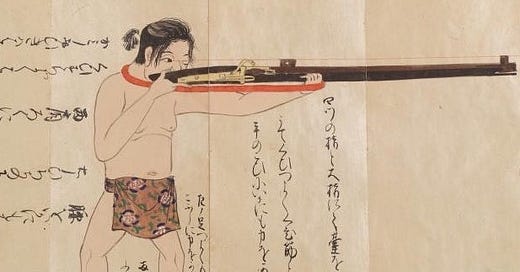Putting the genie back in the barrel (part 1)
In the 1500s, Japan had guns: good ones, and a lot of them. Within a couple of centuries, they had basically none. What happened?
This post is available as a podcast here.
Read this already? Here’s part 2, part 3 and part 4.
I’ll cop to being a bit of a pessimist when it comes to technology, but only the most blinkered techno-cultist could seriously argue that it’d never be desirable to un-invent something.
One could make a strong case, for example, for wiping the internal combustion engine from humanity’s manufacturing repertoire, since that would slow our slide into climate calamity.
Then again, if arresting the apocalypse is your priority, it might be better to focus on un-inventing the bomb.
On our current trajectory—on basically any trajectory—climate change will make the world markedly more hellish in the coming decades. But nuclear war could turn the entire planet into Not-Metaphorical Hell Itself in … a couple hours? Maybe one full day?1
And then, of course, we’ve got further existential horrors in the pipeline. Perhaps we can’t invent something worse than nuclear weapons, per se: once you’ve irradiated the world, you’ve irradiated the world.
But what if the major powers turn over their arsenals—even just the conventional bits—to artificial intelligence, the workings of which are probably understood by no one? World War III might begin with no warning at all, proceeding in ways that stun and confuse us (even more than regular war does), and all at incomprehensible speed.
Okay, that’s all very sobering, but what can we do about it? Technological progress is inevitable (not that “progress” seems like the right word).
Even if the great powers are in rare diplomatic form and all earnestly agree not to build autonomous robot nukes, along comes the inevitable tinpot dictator one of those powers regrets having couped into office 30 years ago. And Field Marshal Homunculus decides that what the People’s Revolutionary Democratic Republic of Tinpotia needs is not food, but autonomous robot nukes.
And that’s just refraining from invention. As for un-invention, impossible. You don’t un-become death, destroyer of worlds.
Right?
Examples of this happening are vanishingly rare: I know of exactly one. And that instance is littered with caveats and controversies. But it has happened. In the 17th century, with a long tapering off into the 18th, Japan gave up the gun.

My source here is, well, Giving Up the Gun, published in 1979 by Dartmouth English professor, Washington Post contributor and extremely early (as in 1990) all-electric car adopter Noel Perrin. It’s a quick read, it’s beautifully illustrated, and it tells one of the most surprising stories I’ve come across—ever.2
Here’s Perrin’s thesis in his own words:
A civilized country, possessing high technology, voluntarily chose to give up an advanced military weapon and to return to a more primitive one. It chose to do this, and it succeeded.
I wish (as Perrin does, in that same section) that this episode provided a luminous blueprint for stripping the world of nuclear weapons. Unfortunately, while fascinating, this story is extremely particular to its context.
The motives behind Japanese gun control were not what you might expect, and they were hardly pure. Plus—spoiler alert—the disarmament was ultimately the work of the central government. Absent a single world state (which I for one am ~0.02% sold on), the shogunate’s de-gunning model won’t cut it.
And of course guns later came back to Japan in a big way. (Actually, they’d been there the whole time. We’ll get to that.)
Still, despite not offering much of an actionable program for staving off the eschaton, Japan’s abandonment of firearms is an incredibly valuable story and, in Perrin’s words, “deserves to be far better known.”
Until I heard about it, I’d of course supported the idea of nuclear disarmament and a slew of other positions in that vein, but deep down I regarded the notion as quixotic, panglossian, doomed. The kind of beat-swords-into-plowshares ideal that makes for better sermons than summits.
Now I’m a smidgen less cynical. There’s a world of difference between zero precedents and—however imperfect—one. So how did Japan give up the gun?
Actually, better to start with how it took up the gun in the fist place.
Next time, Putting the genie back in the barrel (part 2)—the first European guns arrived in Japan in the middle of a century of civil war. They were a hit.
And if you missed it, check out The Black kingdoms of America—the textbooks talk about "European contact" after 1492. But for centuries, large areas of the non-native New World were African—and free.
Notes
Chuckle at my Cold War mindset if you want, but even a simple glitch could spark the nuclear holocaust. Moscow’s ICBM alarms malfunctioned one time during the night shift, and if Soviet Air Defense Forces lieutenant colonel and Literal Savior of Humanity Stanislav Petrov hadn’t held his nerve, the world would have ended on September 26, 1983.
If you’re familiar with this book, there’s a good chance you’re aware of its mostly negative reception among experts in Japanese history. I’ll address the specifics later, but briefly: I hesitated, as an extreme non-expert, to defend Perrin, a milder non-expert, against a phalanx of career historians. After a bit of reading, though, I got the impression that the consensus view makes a less-than-fully-logical leap from “Perrin misdiagnosed the causes of Japan’s abandoning firearms” to “Perrin’s wrong” to “Japan didn’t abandon firearms.” It’s possible that gaining an intimate knowledge of this period’s history would change my mind in favor of the academic orthodoxy. It’s also possible that we’re seeing some combination of academia’s more troublesome tendencies at work: herding, nit-picking, missing the forest for the trees. Basically, you should read these posts—and all my other posts—with a healthy dose of skepticism.


